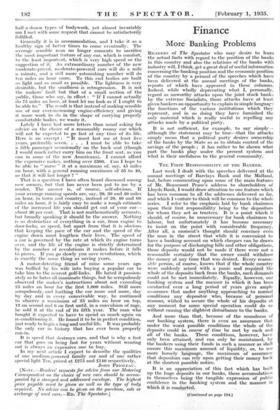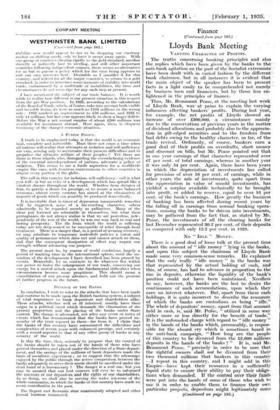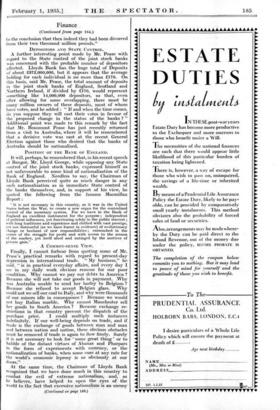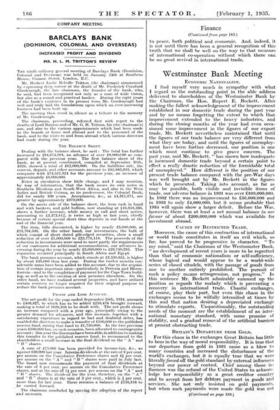Finance
More Banking Problems
READERS of The Spectator who may desire to learn the actual facts with regard to the position of the banks in this country and also the relations of the banks with industry will, I think, get a great deal of useful information concerning the banking position and the economic position of the country by a perusal of the speeches which have been delivered at the annual meetings of the banks, reports of which. have . appeared in these columns. Indeed, while wholly deprecating what I, personally, regard as unworthy attacks upon the joint stock banks by the extreme Socialists, those attacks have at least given bankers an opportunity to explain in simple language the functions of the various institutions which they represent, and in so doing they have furnished the only material. which is really useful in repelling any attacks made by a political party. READERS of The Spectator who may desire to learn the actual facts with regard to the position of the banks in this country and also the relations of the banks with industry will, I think, get a great deal of useful information concerning the banking position and the economic position of the country by a perusal of the speeches which have been delivered at the annual meetings of the banks, reports of which. have . appeared in these columns. Indeed, while wholly deprecating what I, personally, regard as unworthy attacks upon the joint stock banks by the extreme Socialists, those attacks have at least given bankers an opportunity to explain in simple language the functions of the various institutions which they represent, and in so doing they have furnished the only material. which is really useful in repelling any attacks made by a political party.
It is not sufficient, for example, to say simply— although the statement may be true—that the attacks simply mean that a political party desires ownership of the banks by the State so as to obtain control of the savings of the people ; it has rather to be shown what part the banks play under the present system and what is their usefulness to the general community.
THE FIRST RESPONSIBILITY OF THE BANKER.
Last week I dealt with the speeches delivered at the annual meetings' of Barclays Bank and the Midland, but, before commenting upon some of the main features of Mr. Beaumont Pease's address to shareholders of Lloyds Bank, I would draw attention to one feature which has been common to all the addresses delivered so far, and which I venture to think will be common to the whole series. I refer to the emphasis laid by bank chairmen upon their first responsibility being to the depositors for whom they act as trustees. It is a point which it should, of course, be unnecessary for bank chairmen to labour, but unfortunately it has become necessary to insist on the point with considerable frequency. After all, a moment's thought should convince even the man in the street that while it is convenient to have a banking account on which cheques can be drawn for the purpose of discharging bills and other obligations, those deposits would not be made if there were not a reasonable certainty that the owner could withdraw the money at any time that was desired. Every reason- able person, of course, knows that if the whole country were suddenly seized with a panic and required the whole of the deposits back from the banks, such demands could not be met immediately. - Equally, however, our banking system and the manner in which it has been conducted over a long period of years gives ample assurance that under anything approaching -to normal conditions any depositor who, because of , personal reasons, wished to secure the whole of his deposits at any moment for some special operation could do so without causing the slightest disturbance to the banks.
And more than that, because of the soundness of our banking system, there is even an assurance- that under the worst possible conditions the whole of the deposits could in course of time be met by each and all of the banks. These conditions, however, have only been attained, and can only be maintained, by the bankers using their funds in such a manner as shall ensure this maximum amount_ of liquidity, or, to use more homely language, the maximum of assurance that depositors can rely upon getting their money back at the shortest possible notice.
It is an appreciation of this fact which has built up the huge deposits in our banks, these accumulations in themselves being the tangible expression of public confidence in the banking system and the manner in
which it is conducted.
(Continued on page 184.)
Finance
(Continued from page 182.) •
Lloyds Bank Meeting
VARYING CHARACTER OF PROFITS.
The truths concerning banking principles and also the replies which have been given by the banks to the' anti-bank agitation on the part of the Socialist• extremists have been dealt-with in varied fashion by the different bank chairmen: but in all instances it is evident that the main object of the speaker has been to present facts in a light easily to be comprehended not merely by business men and financiers, but by those less en- lightened in the principles of finance.
Thus, Mr. Beaumont Pease, at the meeting last week of Lloyds Bank, was - at pains to explain the varying influences affecting bankers' profits. During last year, for example, the net profits of Lloyds showed an increase of over X200,000, a circumstance mainly due to the conservatism of previous years in the matter of dividend allocations and probably also to the apprecia- tion in gilt-edged securities and to the freedom from bad debts owing to the healthy character, so far, of the trade revival. Ordinarily, of course, bankeiS earn a good deal of their profits on overdrafts, short money and discount on bills, but Mr. Pease pointed out that in one year earnings of that character represented over 67 per cent. of total earnings, whereas in another year it was only 54 per cent. Again, there have been years in which the depreciation of investments has called for provision of over 18 per cent. of earnings, while in other years the sale of investments, quite apart from the appreciation in value of unsold investments, has yielded a surplus available technically to be brought into profit, or added to reserve, equal to over 16 per cent. of the bank's earnings. How greatly the business of banking has been affected during recent years by the falling off in earnings from normal banking opera- tions, causing the banks to be driven into investments, may be gathered from the fact that, as stated by Mr. Pease, the investments of all the clearing banks for . last December represented 30.2 per cent. of their deposits' as compared with only 15.2 per cent. in 1929.
No " IDLE " MONEY. _ There is a good deal of loose talk at the present time about the amount of " idle money " lying in the banks, and upon this subject the chairman of Lloyds Bank made some very common-sense remarks. He explained that the only really " idle money " in the banks was that represented by the actual holding of cash, and this, of course, has had to advance in proportion to •the rise in deposits, otherwise the liquidity of the bank's position could not have been maintained. Needles's to say, however, the banks are the last to desire the continuance of such accumulations, upon which they' earn no interest whatever. But, apart from these cash holdings, it is quite incorrect to describe the resources of which the banks are custodians as being " The whole of depositors' money, apart from that amount held- in cash, is, said Mr. Pedse, utilized in some way either more or less directly for the benefit of trade." It is the unfounded charge with regard to " idle money " in the hands of the banks which, presumably, is respon- sible for the absurd cry which is sometimes heard in the anti-bank campaign, " How long are the people of this country to be divorCed from the £2,000 millions deposits in the hands of the banks ? " It is, said' Mr. Beaumont Pease, " precisely in order to be sure that the rightful owners shall not be divorced from their two thousand millions that bankers in this country —I repeat in this country, and I might add in this Empire—have kept their resources in a sufficiently liquid state to ensure their ability to pay their obliga- tions when demanded. If the control over their funds were put into the hands of some of those who wish to use it in order to enable them to finance their own particular projects, depositors might legitimately come (Continued on page 185.)
Finance
(Continued from page 184.) to the conclusion that then indeed they had been divorced from their two thousand million pounds."
DEPOSITORS AND STATE CONTROL.
A further interesting point made by Mr. Pease with regard to the State control of the joint stock banks was concerned with the probable number of depositors affected. Lloyds Bank has. the huge total of Deposits of about 1372,000,000, but it appears that the average holding for each individual is no more than £170. On this basis, said Mr. Pease, the total amount of deposits in the joint stock banks of England, Scotland and Northern Ireland, if divided by £170, would represent something like 14,000,000 depositors, so that, even after allowing for some overlapping, there must be many million owners of these deposits, most of whom have votes, and he added : " If and when the time comes, do you suppose they will cast their votes in favour of the proposed change in the status of the banks ? " Additional point was made to this remark by the fact that Mr. Beaumont Pease has just recently returned from a visit to Australia, where it will be remembered that a decisive vote was cast at the recent General Election against those who desired that the banks of Australia should be nationalized.
POSITION OF THE BANK OF ENGLAND.
It will, perhaps, be remembered that, in his recent speech at Bangor, Mr. Lloyd George, while opposing any State control of the joint stock banks, expressed himself as not unfavourable to some kind of nationalization of the Bank of England. Needless to say, the Chairman of Lloyds Bank perceived quite as much danger in any such nationalization as in immediate State control of the banks themselves, and, in support of his view, he quoted the following from the famous Macmillan Report : " It is not necessary in this country, as it was in the United States before the War, to create a new organ for the centralized control of the monetary system. For we have in the Bank of England an excellent instrument for the purpose ; independent of political influences, yet functioning solely in the public interest ; with long traditions and experience and clothed with vast prestige, yet not distrustful (as we have learnt in evidence) of evolutionary change or hesitant of new responsibilities ; entrenched in the centre of the struggle for profit and with access to the arcana of the market, yet itself aloof and untinged by the motives of private gain." A COMMON-SENSE VIEW.
Finally, I cannot forbear from quoting some of Mr. Pease's practical remarks with regard to present-day depression in international trade. " My business," he said, " is in practical everyday affairs, and every day I see in my daily work obvious reasons for our poor condition. Why cannot we pay our debts to America ? Because she will not take our goods in payment. _Why was Australia unable to send "her" barley to Belgium ? Because she refused to accept Belgian glass. Why could not we sell our coal to Italy, and why were thousands of our miners idle in consequence ? Because we would not buy Italian marble. Why cannot Manchester sell her goods "to South America ? Because exchange re-: strictions in that country prevent the dispatch of the purchase pried. I could multiply such instances indefinitely. If our well-being depends on trade, and if trade is the exchange of goods between man and man and between nation and nation, these obvioUs obstacles must be removed if trade is again to flow freely. Surely it is not necessary to look for ' some great thing' or to babble of the distant virtues of Abanas and Pharpars in the form of experiments with currency, or the nationalization of banks, when some cure at any rate for the world's economic leprosy is so obviously at our doors." , At the same time, the Chairman of Lloyds Bank recognized that we have done much in this country to combat the evil of extreme nationalism, and, as he believes, have helped to open the eyes of the world to the fact that excessive nationalism is an enemy (Continued on page 186.)
Finance
(Continued from page 185.)
to peace, both political and economic. And, indeed, it is not until there has been a general recognition of this truth that we shall be well on the way to that measure of international co-operation without which there can be no great revival in international trade.

















































 Previous page
Previous page